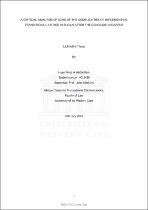| dc.description.abstract | In recent decades, the lives of millions of civilians have been devastated in the Darfur region in western Sudan, by the attacks of the militia Janjaweed, with the support of the government army under the supervision of senior officials, including former President Omar al-Bashir. As a result, the Sudan Liberation Movement Army (SPLM/A) and Justice and Equality Movement (JEM) were founded in 2003 to fight the government of Sudan and its militia to stop attacks on civilians and restore political stability to the Republic of Sudan. The conflict caused massive human rights violations classified as crimes against humanity in forms of murder, mass rape, mass displacement of civilians and burning etc. After Sudan's great revolution led to a regime change in 2019, transitional justice in the Darfur region continues to face huge challenges. | en_US |

